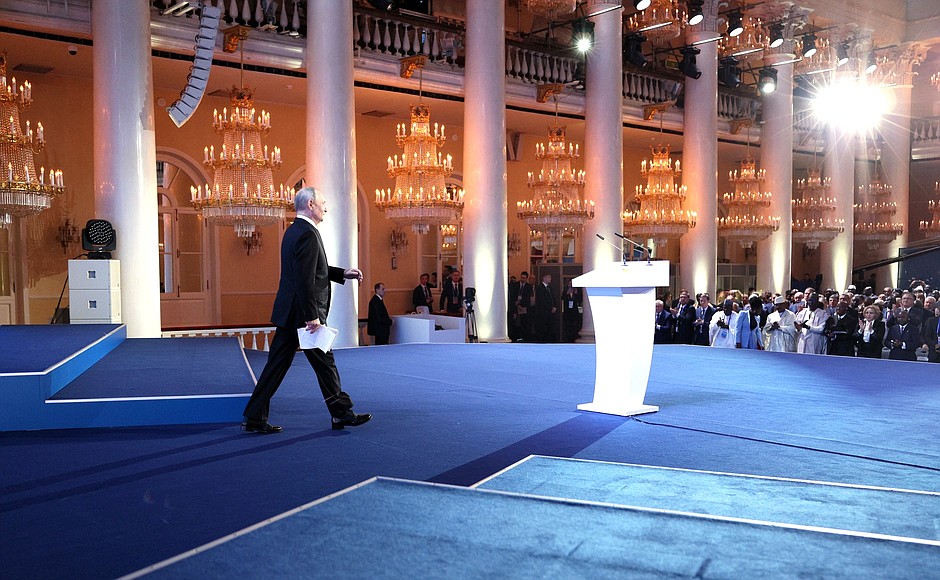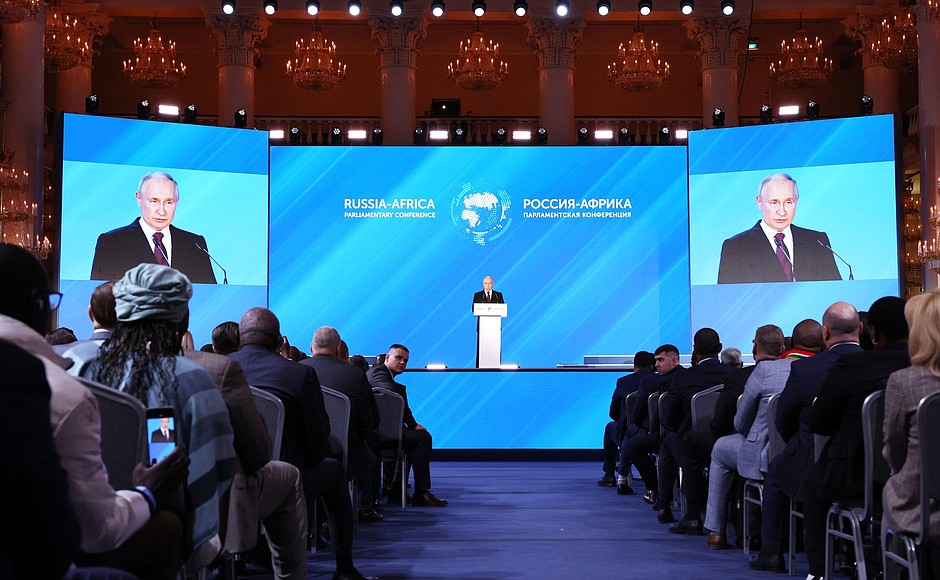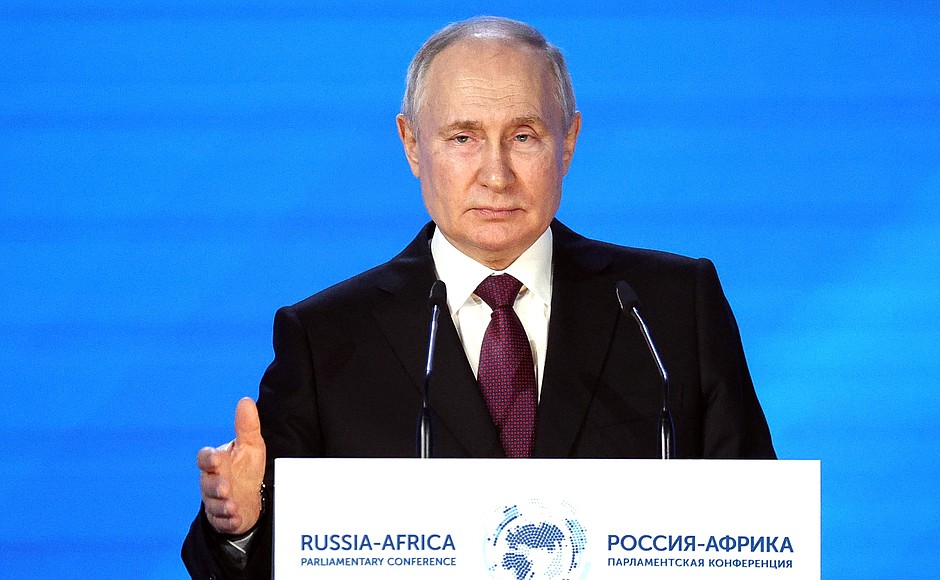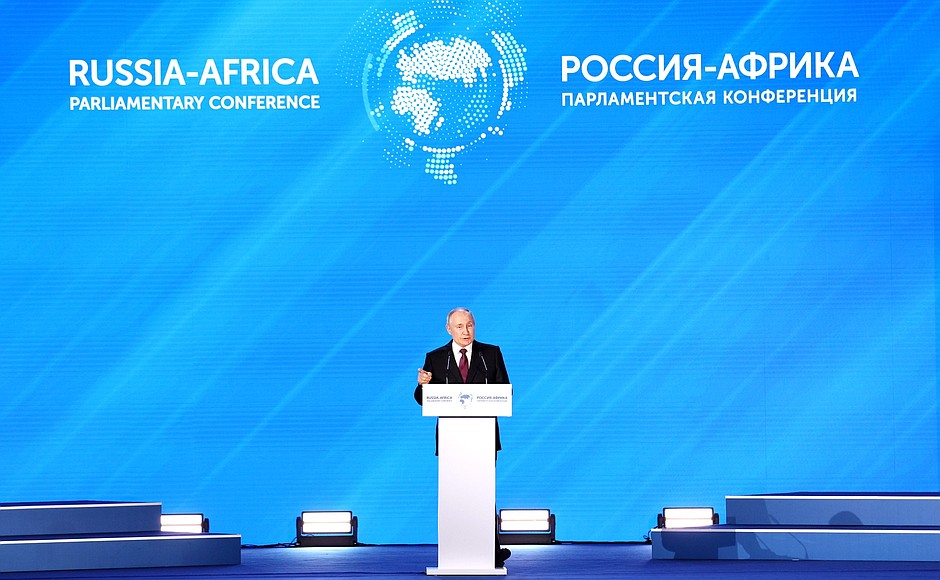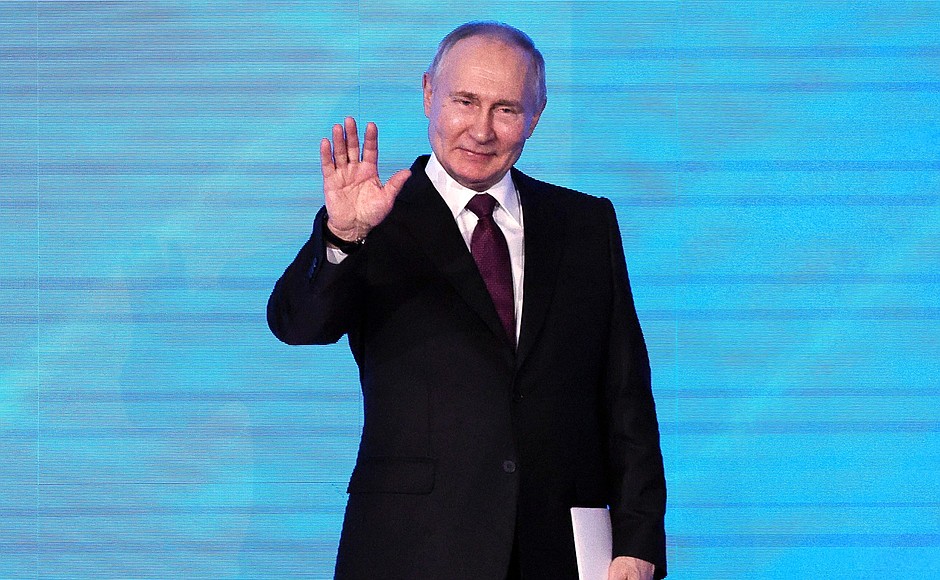President of Russia Vladimir Putin: Dear friends,
I would like to sincerely welcome all the representatives of legislative bodies and leaders of political parties and public movements from African states in Moscow and at the international parliamentary conference.
Your conference is undoubtedly important in the context of the continued development of Russia’s multifaceted cooperation with the countries of the African continent. We also consider this event a key part of the preparations for the upcoming second Russia-Africa summit scheduled to be held in St Petersburg in July.
The first Russian-African summit held in October 2019 in Sochi was very productive and noticeably invigorated our ties with African states, gave a boost to business interaction and cultural and humanitarian exchanges. The partnership between Russia and African countries has gained additional momentum and is reaching a whole new level.
This conference brings together representatives of most countries on the continent. Given that it is legislators who are supposed to express the will of their voters in their countries and work in the interests of their people, your arrival shows that the peoples of Africa are interested in stepping up efforts to develop multifaceted and mutually beneficial relations with Russia.
I want to emphasise that our country has always and will always consider cooperation with African states a priority. It would not be an exaggeration to say that it is one of the unchanging priorities of Russia’s foreign policy.
Ever since the African peoples’ heroic struggle for independence, it has been common knowledge that the Soviet Union provided significant support to the peoples of Africa in their fight against colonialism, racism and apartheid, how it helped many African countries to gain and protect their sovereignty, and consistently supported them in building their statehood, strengthening defence capabilities, laying the foundations of their national economies and workforce training. The symbol of this cooperation was the construction by Soviet experts of the Aswan Dam, the largest in Africa. And today, the Russian Federation continues its policy of providing the continent with support and assistance.
The process of establishing the African Continental Free Trade Area, which began in 2021, opens up additional opportunities. In the future, this zone will become a continental market with a total GDP of more than three trillion dollars. We are in favour of actively developing ties with this new association both within the Eurasian Economic Union and bilaterally.
Large Russian investment projects are being implemented in Africa, involving such domestic companies as Rosneft, Gazpromneft, RusHydro, ALROSA, Lukoil and many others. We will continue to help African countries with electricity production, which so far covers only a quarter of the continent’s needs.
Today we are offering new environmentally friendly technologies, primarily in nuclear energy. Rosatom is already building a nuclear power plant in Egypt and plans to expand its involvement in the development of the national energy systems of the African continent. I would like to note that significant, in some countries 100-percent funding is provided by Russia. These are serious projects worth 15, 20 or 25 billion dollars.
Russian-African cooperation in the field of high technologies is also being strengthened. For example, Russia is helping to create the ANGOSAT satellite communication and television broadcasting system in Angola. Yandex is actively introducing information services to organise the transportation of passengers by taxi and other modes of transport in African countries. At the same time, Russia is always ready to share its technologies with African countries; it offers precisely joint, diverse technological development.
I would like to stress that Russia is reliably fulfilling all its obligations pertaining to the supply of food, fertilisers, fuel and other products that are critically important to the countries of Africa, helping to ensure their food and energy security. You probably know that we are ready to supply some of the resources we have frozen in European countries to countries in need free of charge, including fertilisers; and the first batches have already been sent. But unfortunately, there are obstacles here as well.
Russia, guided by the needs of African countries, first and foremost, has recently agreed to extend the agreement concluded in Istanbul on the export of Ukrainian food through the Black Sea and the unblocking of Russian agricultural exports and fertiliser supplies for another 60 days.
At the same time, we insist on the package nature of this deal – above all, in the interests of African and other developing countries, considering that they need large amounts of food – we insist on full compliance with Russia’s key requirements, first of all, as I said, making sure that grain and fertilisers go to the African countries in need, and not to satiated European markets and countries. Meanwhile, about 45 percent of the total volume of grain exported from Ukraine went to European countries, and only three percent went to Africa. Now, perhaps I will say two more words about this.
Let me stress that only if our position is taken into account will the fair and comprehensive implementation of the Black Sea grain deal be ensured, and depending on this, we will decide on our further participation in it. For reference, I can give you the following information. From August 1, 2022, to March 20, 2023, 827 ships left Ukraine, of which only three million tonnes of grain were sent to Africa and 1.3 million to the poorest countries in Africa. As I said, almost 45 percent went to well-fed European countries, despite the fact that this whole deal was presented under the pretext of ensuring the interests of African countries.
By the way, let me note that at the same time, despite all the restrictions and limitations on the export of Russian grain, almost 12 million tonnes were sent from Russia to Africa.
I would also like to add that if we decide not to extend this deal after 60 days, Russia will be ready to supply the same amount that was delivered under the deal, from Russia to the African countries in great need, at no expense. (Applause.)
Cooperation between Russia and African countries in education is at a traditionally high level. Today about 27,000 African students are studying in Russia, including 5,000 whose education is covered by the federal budget. At the same time, the annual quota for state-funded scholarships at Russian universities will be more than doubled. The project of the Russian-African Network University has entered its practical stage.
We intend to step up cooperation on such important topics for Africa as medicine and healthcare, as well as ensuring biological and epidemiological safety. In order to do this, Russia is ready to transfer fully equipped mobile labs and modern medicines to Africans, and to train specialists.
During the coronavirus pandemic, Russia was among the first countries to provide African states with large volumes of vaccines, test kits, personal protective equipment, and other medical and humanitarian cargoes.
And, of course, Russia always lends a helping hand to African countries in relieving the devastating consequences of natural disasters: floods, fires, hurricanes and droughts. Cooperation in the fight against terrorism and extremism has seen significant progress in recent years.
Military and defence industry cooperation continues, including the supply of Russian weapons and military equipment to African partners, and the training of relevant personnel. Currently, military personnel from over 20 African countries are studying at the institutes of the Russian Ministry of Defence.
Friends,
We are hard at work preparing for the second Russian-African summit and, of course, we will be glad to see leaders of all African countries, as well as heads of regional organisations, at this forum.
A busy and substantive agenda is being prepared for the summit and the economic and humanitarian forums held together with it. In total, there are plans to hold more than a hundred most diverse events ahead of and during the summit.
In conclusion, I would like to recall the words of an outstanding African statesman and fighter for the independence and rights of the peoples of Africa, Nelson Mandela, which still sound so relevant today: nothing should divert us from the road to freedom, and we should not allow anyone to stand in our way. I believe that by joining our efforts and helping each other, we can do so much for the prosperity and well-being of the peoples of Africa and Russia.
Thank you very much for being here in Moscow with us today. Thank you. Good luck to you. All the best.
